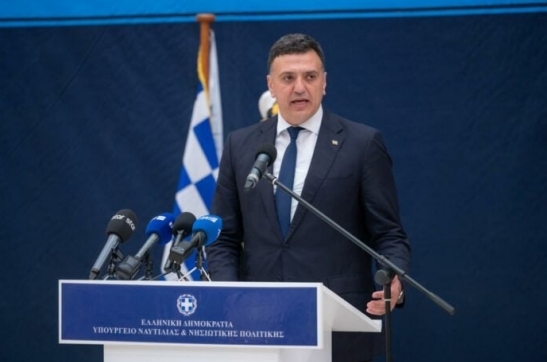By Michalis Psilos

Minister of Maritime Affairs and Insular Policy, Vasilis Kikilias said in an interview with Naftemporiki that the 50% reduction in port fees as of May 1 will keep prices at last year’s levels, while it will allow a reduction in high-speed ferries.
“Today, we are dealing with the factors that increase the costs of tickets and we believe that in a short time we will have other positive news on this issue,” noted Kikilias. At the moment, there are also significant reductions for students, workers on the islands, large families, and beneficiaries of social tourism, he added.
He also pointed out that a key pillar of the ministry’s strategy is safety with new, green and faster ships with amenities, while on the issue of delays or cancellations of routes, he stated that the legislation provides for an obligation for timely information to passengers as well as strict penalties.
The interview with Michael Psilos and Paris Tsirigotis follows:
You recently announced a reduction in port fees in order to contain the prices of ferry tickets in view of the implementation of the new fuel in Coastal Shipping from May 1. What do you expect?
“Coastal shipping ticket prices should be kept at last year’s levels without excluding the reduction of prices in some categories such as high-speed ferries. The increase in operating costs for ships is expected as of May 1 with the new EU regulation that will be implemented for ships traveling in the Mediterranean and they will have to use a mixture with a lower sulfur content.
Very correct environmental policy but expensive. Especially for us, Greeks, with dozens of island destinations.
We travel constantly, and we have a huge maritime network for transporting people and goods to and from our islands throughout the year. And yes, for our vacations, it cannot be a “luxury” for a family with their children to go to an island.
So our goal is to limit the cost of travel and from May 1, when the measure of reducing port fees will come into effect, and to also contain ticket prices.”
Important decisions are expected on the issue of ticket prices from high-speed ferries that already burn this specific fuel. If high-speed ferries do not reduce, but instead increase prices, are some specific measures expected to be taken?
“High-speed ferries already burn the new fuel, so the cost for them does not change. So, the reduction in port fees allows them to reduce their ticket prices. But let me be clear: The coastal ferry market, like the airline market, except for the so-called ‘barren lines,’ is liberalized, free competition operates.
What I believe is that after our package of measures, competition will work to the benefit of citizens, and we will see reductions in high-speed ferry tickets. Now, the State cannot intervene in free competition, but it has other weapons that will not allow the distortion of competition and possible bad business practices.”
“We want new, green, faster ships and, above all, safe ones.”
What is the Ministry’s overall strategy for upgrading coastal shipping in the next five years?
“The main pillar of our strategy is ‘safety’. We want new, we want green, we want faster, we want ships with comfort, but above all, we want safe ships. In every destination with smaller or larger capacity, winter and summer, safe ships.
The Greek coastal shipping market is a mature market, with the potential for further development both by utilizing community resources and by activating private capital. The prospects are very positive as we also have a progressive increase in tourism every year, so I do not see any inhibiting factor that is problematic.”
Do you think that the current coastal shipping network meets the needs of the islanders and visitors?
“Last year, approximately ‘2.5 Greeces’ traveled by coastal shipping ships, not counting ferries! That is, 25 million passengers and 5.8 million vehicles that disembarked on our islands. It is a huge transport project, and of course, the fleet of all these ships is not at the same level.
Some need renewal, and more ships are needed on some lines. However, you raised a very important issue: The modification of the existing coastal shipping network. It is a network that has been structured and operated for decades without radical changes.
I believe that modern living conditions and the needs of the islanders and visitors create new conditions that we must take into account. And a careful redesign of the existing coastal shipping network should be carried out while utilizing new technologies for managing transport flows and technical intelligence.”
Projects in the major ports
At what stage are the modernization projects in major ports such as Piraeus, Rafina, and Lavrio? Will passenger service improve?
“Since 2019, when we took over the governance of the country, the major ports of the country have been in a dynamic phase of development, and this is not an estimate; it is proven by the data itself. There is certainly a need for new major investments, public and private, and certainly, many regional ports must be further developed. We are already running a major investment program throughout the country, amounting to 583 million euros from co-financed programs.
But beyond the heavy infrastructure projects, the service provision policy, the service to passengers in the ports, is equally or more important. Passenger ports should resemble modern airports. They must offer passenger service, quality hospitality, and hygiene infrastructure, continuous information with travel information, etc. Waiting areas, service points, and electronic route information must be functional, and friendly to passengers. This is not a luxury; it is the essence of politics. And the essence of politics for us is the person.”
(Editor: wangsu )


